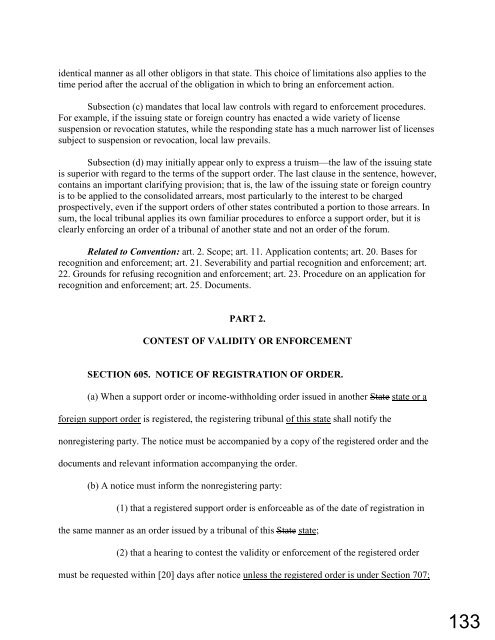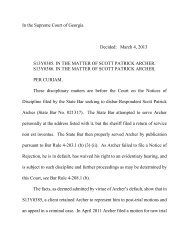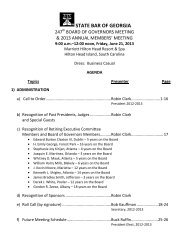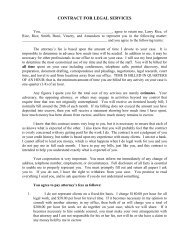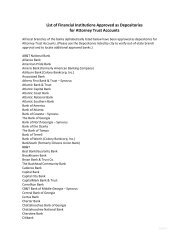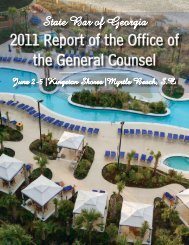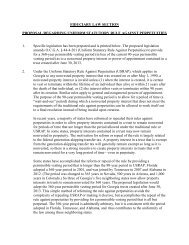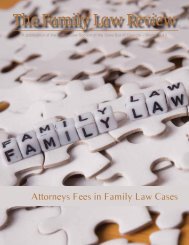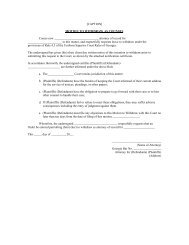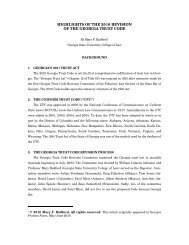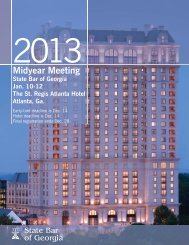2008 Amendments to the Uniform Interstate Family Support Act ...
2008 Amendments to the Uniform Interstate Family Support Act ...
2008 Amendments to the Uniform Interstate Family Support Act ...
You also want an ePaper? Increase the reach of your titles
YUMPU automatically turns print PDFs into web optimized ePapers that Google loves.
identical manner as all o<strong>the</strong>r obligors in that state. This choice of limitations also applies <strong>to</strong> <strong>the</strong><br />
time period after <strong>the</strong> accrual of <strong>the</strong> obligation in which <strong>to</strong> bring an enforcement action.<br />
Subsection (c) mandates that local law controls with regard <strong>to</strong> enforcement procedures.<br />
For example, if <strong>the</strong> issuing state or foreign country has enacted a wide variety of license<br />
suspension or revocation statutes, while <strong>the</strong> responding state has a much narrower list of licenses<br />
subject <strong>to</strong> suspension or revocation, local law prevails.<br />
Subsection (d) may initially appear only <strong>to</strong> express a truism—<strong>the</strong> law of <strong>the</strong> issuing state<br />
is superior with regard <strong>to</strong> <strong>the</strong> terms of <strong>the</strong> support order. The last clause in <strong>the</strong> sentence, however,<br />
contains an important clarifying provision; that is, <strong>the</strong> law of <strong>the</strong> issuing state or foreign country<br />
is <strong>to</strong> be applied <strong>to</strong> <strong>the</strong> consolidated arrears, most particularly <strong>to</strong> <strong>the</strong> interest <strong>to</strong> be charged<br />
prospectively, even if <strong>the</strong> support orders of o<strong>the</strong>r states contributed a portion <strong>to</strong> those arrears. In<br />
sum, <strong>the</strong> local tribunal applies its own familiar procedures <strong>to</strong> enforce a support order, but it is<br />
clearly enforcing an order of a tribunal of ano<strong>the</strong>r state and not an order of <strong>the</strong> forum.<br />
Related <strong>to</strong> Convention: art. 2. Scope; art. 11. Application contents; art. 20. Bases for<br />
recognition and enforcement; art. 21. Severability and partial recognition and enforcement; art.<br />
22. Grounds for refusing recognition and enforcement; art. 23. Procedure on an application for<br />
recognition and enforcement; art. 25. Documents.<br />
PART 2.<br />
CONTEST OF VALIDITY OR ENFORCEMENT<br />
SECTION 605. NOTICE OF REGISTRATION OF ORDER.<br />
(a) When a support order or income-withholding order issued in ano<strong>the</strong>r State state or a<br />
foreign support order is registered, <strong>the</strong> registering tribunal of this state shall notify <strong>the</strong><br />
nonregistering party. The notice must be accompanied by a copy of <strong>the</strong> registered order and <strong>the</strong><br />
documents and relevant information accompanying <strong>the</strong> order.<br />
(b) A notice must inform <strong>the</strong> nonregistering party:<br />
(1) that a registered support order is enforceable as of <strong>the</strong> date of registration in<br />
<strong>the</strong> same manner as an order issued by a tribunal of this State state;<br />
(2) that a hearing <strong>to</strong> contest <strong>the</strong> validity or enforcement of <strong>the</strong> registered order<br />
must be requested within [20] days after notice unless <strong>the</strong> registered order is under Section 707;<br />
133


